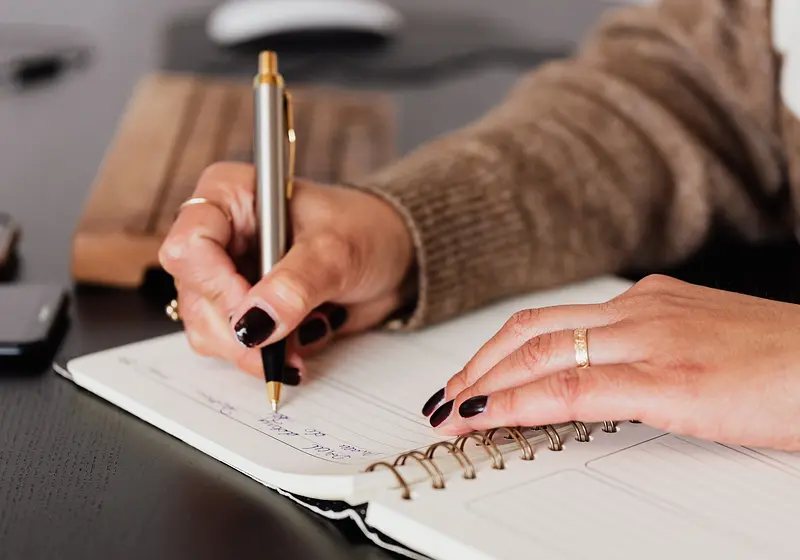If you've ever had an interest in journaling, the new year is the perfect opportunity to start. Journaling has been proven to provide a plethora of benefits when it comes to mental and physical health, and it's not too late to hop on the bandwagon! Whether you're planning on committing to a daily journal or just want to bullet journal here and there, these tips will help you kick start a great new habit in no time.
Most people know that journaling is a great tool to combat stress and anxiety, provide a clarifying outlet, and improve the relationship you have with yourself. If done daily, it can dramatically improve your mood and become a chronicle of your unrestricted emotions and vulnerability that you can use to track your growth.
It may come as a surprise, but journaling can also help your physical health, from boosting your immune system to sharpening your memory to healing wounds quicker. But it's not the why that makes it hard for people to actually start; it's the how. Beginning a journal can be a daunting task, but that shouldn't shy you away from the practice. So how do you start?
Free Yourself From Judgement
First thing's first: clear your mind of any doubt. It can be hard to be your unapologetic self, even on paper. Academic writing has taught most of us to remain neutral; do not bring in any emotion that may cloud the meaning of the topic or text.
But this isn't academic writing. This doesn't even have to be remotely good writing. The great thing about journaling is that it is entirely up to you.
Write full sentences if you want. Partial sentences. Fragments.
Whatever helps you express yourself the best. Let go of any voice inside your head telling you what you're writing needs to be polished, or it isn't worthy of permanent ink. The point of journaling is to find yourself and find your creativity. So push that critic away and absolve yourself of any judgment.
Figure Out What Kind of Journaling You Want to Do
Next, you should begin figuring out what kind of journaling you are most interested in. This may take some trial and error, but if you have an idea in mind, it is much easier to get started. If you're someone that doesn't like the idea of bearing your soul to the page, you might want to consider a bullet journal or even a burn book.
A bullet journal is like a creative planner: you can create lists, mood trackers, goals, calendars, and really anything else to keep your life organized. Bullet journals, the keyword being "bullet", are great because they are easy to keep up with even if you don't have a ton of time.
Burn books are a bit different. The purpose of a burn book is to keep a journal with the intention of getting rid of it when it's full. So there's no pressure.
You can write your deepest, most secret and vulnerable thoughts without the worry of prying eyes. This type of journaling is super effective because it allows you to be your complete self when no one is watching, and that might help you learn more about who you are as a person. You may even reconsider "burning" it when you're done.
Daily journals, also known as diaries, are targeted at people with more time on their hands, but anyone can have one. Set aside time every day to jot down the happenings of your day, feelings, thoughts, or anything else you deem important. You could even talk about the weather.
Daily journals don't have to be deep and life-changing. They can be quick records of your days and go as in-depth as you want. I love keeping a daily journal because it is fun to re-read past entries and re-live the memories of those days.
Gratitude journals have become more prevalent, especially among mindfulness enthusiasts. The goal of this type of journal is to take more time to appreciate people, things, and experiences in your life. Many people journal this way in the morning and night, so they can set goals for the day and then reflect upon them.
There are plenty of other types of journals; these are just a few big ones. And if none of these are grabbing you, you can keep what I call an anything journal which is exactly what it sounds like. There are no rules, no expectations, and no daily requirements. Just write absolutely anything you want!
Pick A Journal
Now that you've decided what type of journaling piques your interest, you can start the fun part. If you're like me, the physical journal is crucial and can make or break a journaling experience. Find something you'll be excited to write in.
You can find unique journals pretty much anywhere, but I would recommend Amazon or Etsy. And if buying a brand-new journal isn't realistic, you can use an old-school notebook and still make it special. Some of my favorite journals have been $1 notebooks that I decorate with stickers.
For those of you that are more organized or interested in trying different types of journaling all at once, you may want multiple. I've also found that the thing you write with—a sparkly gel pen, a blue ballpoint, or even just a yellow number two pencil—is equally important. If journaling is going to be an aesthetic hobby, it has to look the part!
Of course, these materials don't really matter. But journaling should be a fun experience, and often, cute journals and pens can add to this fun. Journaling should also be whatever you want it to be and completely customized to you. The center of this practice is you, and that's probably the mot important thing to remember when beginning your journal.
Find A Place
Space is important. You'll want a calm environment where you can get your best thoughts out; journaling distracted will likely just be more stressful. It also helps to have a clean space. Journaling is a cleansing escape that works best when your space is just as clean.
Also, keep your journal separate from your homework. You may have heard it's best to not do homework in your bed, so your brain doesn't start associating that space with stress and work. The same is true for journaling.
If this means simply journaling in a different space from where you typically do your homework, so be it. Journaling is not a chore, so don't make it one by assigning it the same space, time, and worth as homework.
Make Time
Next, set aside space and time to journal. Even just five minutes will be beneficial. My favorite time to journal is right before bed, but it's completely up to you.
You may even want to spend some time during the day to stop and regroup, especially when things are stressful. For this, I like to bring my journal with me to school. That way, I can quickly jot down anything during the day when my creative juices are at its peak flow.
You can also keep a journal in the morning if you're more interested in the forward-thinking approach. This is good for making goals and setting affirmations to start your day on a good note.
Once you have a journaling method, a physical journal, and time and space to do it, you'll be good to go. Be sure to check out the myriad of resources out there with other tips and ideas. But remember not to get overwhelmed.
There's no right way to journal, so don't feel pressured to follow a rigid schedule or someone else's journaling ritual. And don't set too many rules for yourself. Journaling is only helpful if you enjoy it, so just have fun with it.














